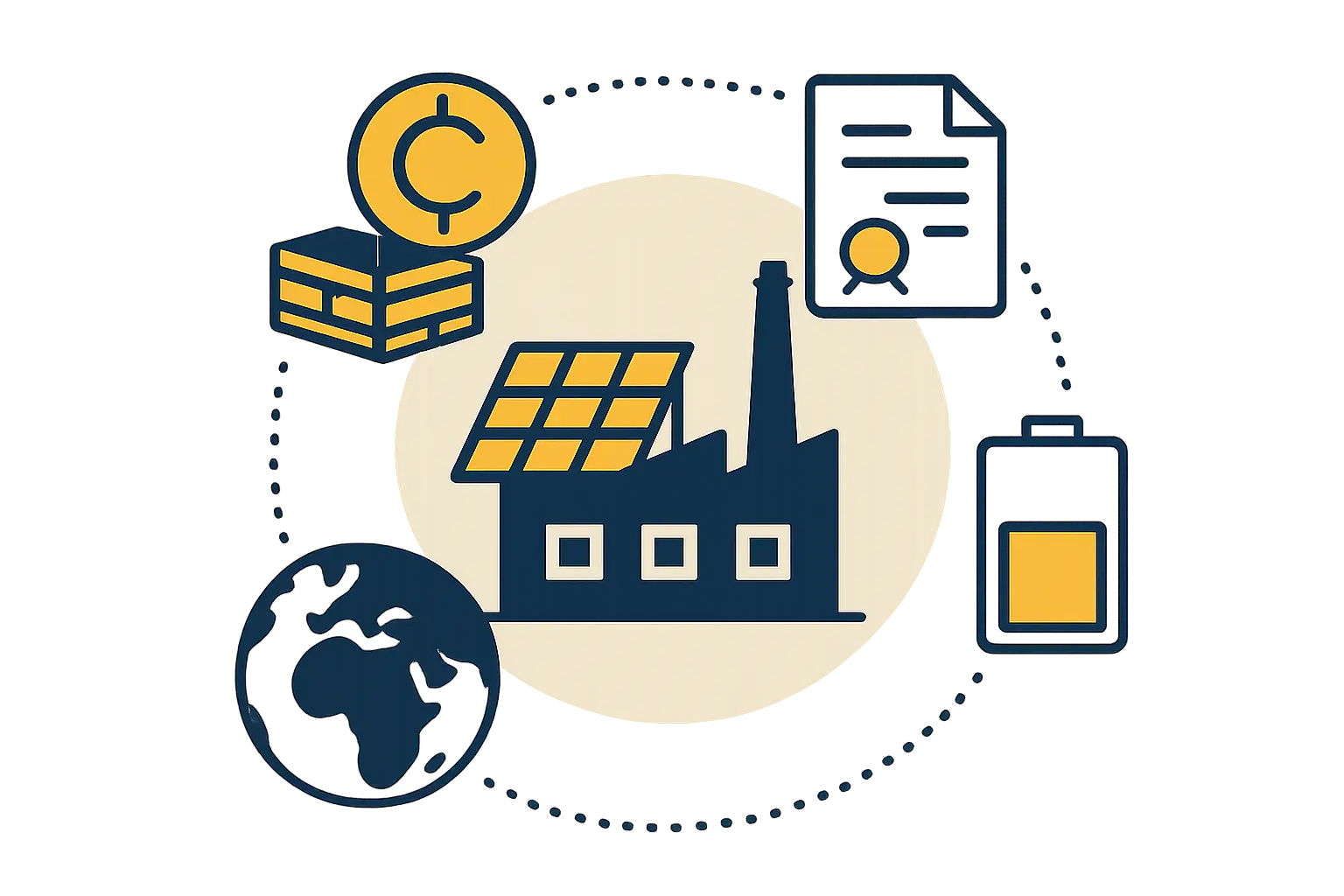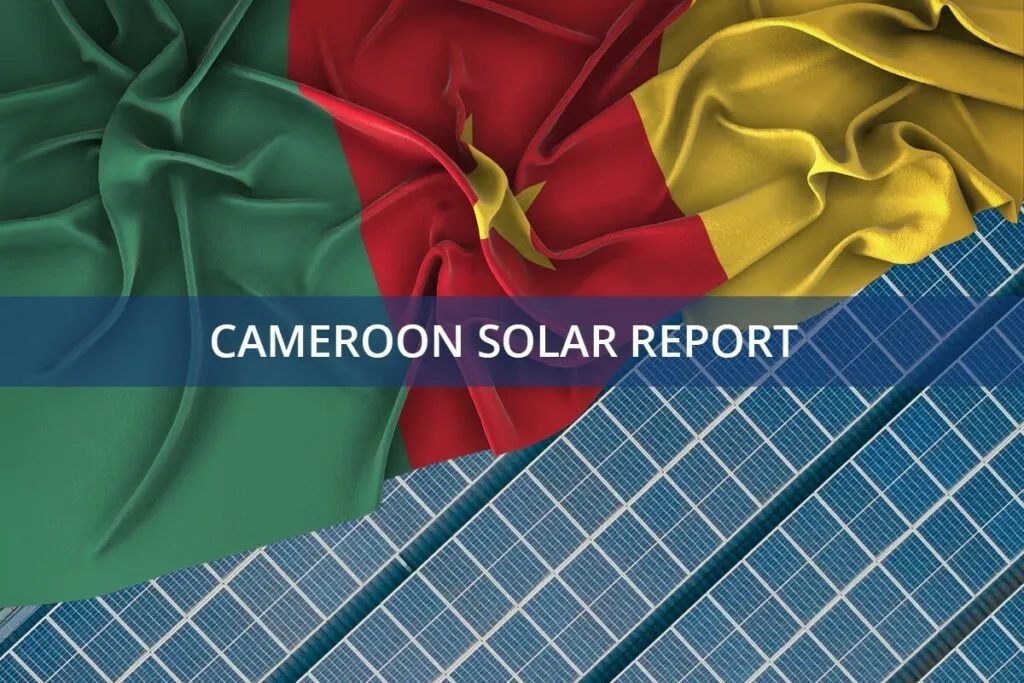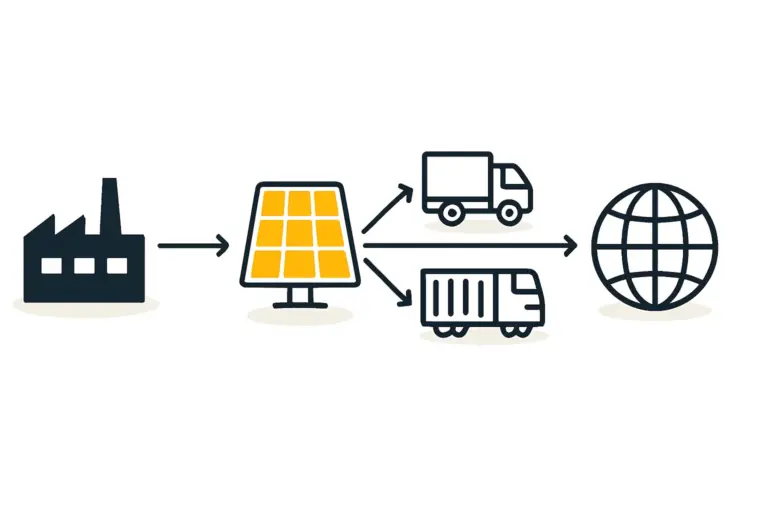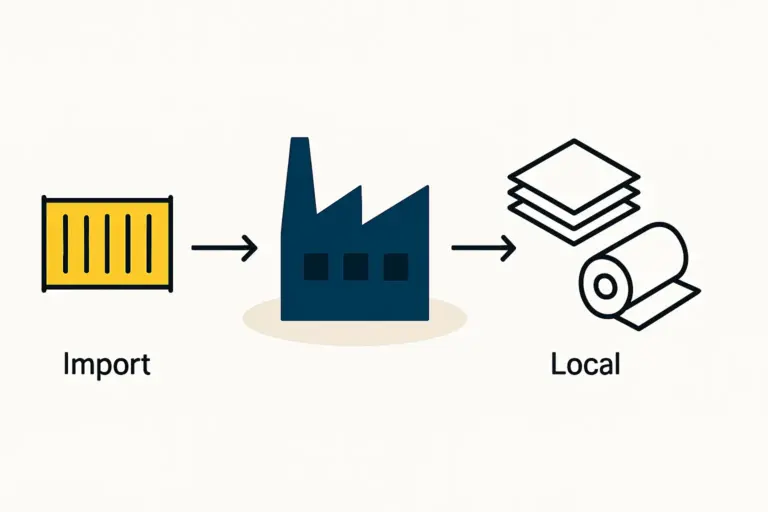Entrepreneurs exploring solar module manufacturing often focus on machinery, financing, and factory layout. While these elements are crucial, they can overshadow the most critical operational asset: the human workforce.
The long-term success and quality of a solar factory depend not on its automated systems alone, but on the skilled and well-trained people who operate, maintain, and manage them.
This analysis offers a structured overview of the technical labor landscape in Cameroon. It examines the availability of skilled and semi-skilled workers in key industrial zones, outlines typical wage structures, and details the training required to build a competent team for solar module assembly and quality control.
Table of Contents
Understanding Cameroon’s Labor Market: A Macro View
Assessing the potential for a technical workforce starts with the country’s demographic and educational foundation—an area where Cameroon offers several advantages for new industrial ventures.
With a population exceeding 27 million and a median age of just 18.7 years, the country has a substantial and youthful labor pool. This youthful demographic, coupled with a national literacy rate of approximately 77%, creates a strong foundation for training.
With nearly 58% of the population in urban areas, the supply of potential employees is concentrated in and around the nation’s industrial centers.
For a potential investor, these figures point to a significant opportunity: access to a large, young, and literate population that can be trained for the specific tasks of a modern manufacturing environment. The challenge lies not in the quantity of available labor, but in channeling it through structured recruitment and skill-development programs.
Key Industrial Hubs for Solar Manufacturing
The location of a manufacturing facility directly influences its access to labor, logistics, and infrastructure. In Cameroon, three primary regions stand out as logical centers for industrial development.

Douala: The Economic Engine
As Cameroon’s largest city and primary port, Douala is the country’s undisputed economic hub. Its long-established industrial base has fostered a mature and diverse labor market, allowing businesses to draw from a workforce with existing experience in manufacturing, logistics, and international trade. The trade-off, however, is greater competition for skilled technicians and engineers, which in turn drives up wage expectations.
Kribi: The Emerging Deep-Sea Port
Kribi represents a modern, strategic alternative. The development of its deep-sea port has created a new industrial corridor with state-of-the-art infrastructure. While its local labor pool is still developing compared to Douala, its strategic importance is growing rapidly. A facility in Kribi offers streamlined logistics for importing raw materials and exporting finished modules. The workforce here may require more foundational training, but it is part of a focused national development zone.
Yaoundé: The Administrative Capital
As the nation’s capital, Yaoundé is the center of government and home to many of Cameroon’s leading universities, including the National Advanced School of Engineering (ENSP). This gives businesses excellent access to a pipeline of educated graduates for management, engineering, and administrative roles. While its industrial base is less developed than Douala’s, its proximity to regulatory bodies and a highly educated talent pool makes it a strong contender, particularly for businesses focused on research and development alongside production.
Identifying the Right Skills for Solar Module Assembly
A common misconception is that a solar panel factory requires a large team of seasoned solar experts. In reality, most roles on an assembly line are best filled by individuals with strong general aptitudes who then undergo specialized, process-specific training.
A successful production team is typically built on three tiers of competence.

Semi-Skilled Labor: The Core of the Production Line
These roles—such as machine operators for stringers, laminators, and framing stations—form the backbone of the assembly process. Ideal candidates demonstrate good hand-eye coordination, attention to detail, and the ability to consistently follow standardized procedures. Cameroon’s large pool of young, literate job seekers, particularly those with basic diplomas from vocational centers (CFPC) or technical schools, are well-suited for these positions after targeted training.
Skilled Technicians and Quality Control Personnel
This group ensures the facility and its output meet technical specifications. It includes maintenance technicians who service the machinery and quality control (QC) inspectors who operate essential testing equipment. Candidates for these roles typically require a more advanced technical diploma or degree from institutions like the University Institute of Technology (IUT) in Douala. Their work is critical, as they manage the quality control equipment that validates the performance and durability of every module.
Management and Engineering Staff
Production managers, process engineers, and the head of quality assurance oversee the factory’s overall efficiency, safety, and output. These positions require university-level degrees in fields like mechanical, electrical, or industrial engineering. Local universities are a strong source for junior and mid-level engineers, who can be developed into senior leaders over time.
Navigating Wage Structures and Labor Costs
While labor costs in Cameroon are competitive, establishing a fair and motivating compensation structure is key to attracting and retaining qualified staff. Investors should look beyond the official minimum wage (Salaire Minimum Interprofessionnel Garanti – SMIG), which stood at CFA 41,875 per month as of 2023. For technical manufacturing roles, market rates are considerably higher.
Based on data from industrial operations in the country, typical monthly salary ranges are as follows:
- Semi-skilled Line Operator: CFA 75,000 – 150,000
- Skilled Technician / QC Inspector: CFA 150,000 – 300,000
- Graduate Engineer / Supervisor: CFA 300,000 – 600,000+
Investors should plan to offer wages that are competitive within the local industrial sector. This approach helps reduce employee turnover and fosters a more committed and productive workforce. Ultimately, the return on investment comes from high productivity and low defect rates—both direct results of a well-compensated and well-trained team.
The Critical Role of Structured Training Programs
Even with high-quality recruits, a workforce cannot produce certified, high-performance solar modules without specialized training. This step is non-negotiable for the operational success of any turnkey solar manufacturing line.
A comprehensive training program bridges the gap between general education and the specific, high-stakes tasks of solar module assembly.

Foundational Training for Line Operators
This program, typically lasting two to four weeks, focuses on hands-on instruction. Team members learn correct procedures for handling delicate materials like solar cells, operating their specific station’s machinery, adhering to safety protocols, and performing basic visual quality checks. Consistency and adherence to standards are the primary goals.
Advanced Training for Quality and Maintenance Teams
Technicians in these roles require deeper knowledge. Their training covers everything from the principles of solar cell technology to the operation of sophisticated testing machines like sun simulators and electroluminescence (EL) testers, as well as the interpretation of test results. This knowledge is fundamental for ensuring every module meets the stringent performance and safety criteria required for certification. Maintenance teams receive training in preventative maintenance schedules and equipment troubleshooting to minimize downtime.
Based on experience from J.v.G. Technology GmbH projects in emerging markets, a “train-the-trainer” model is highly effective. An external team of experts initially leads the training, qualifying a core group of local supervisors and technicians. This group then becomes the internal resource for training all future hires.
FAQ: Common Questions on Labor for Solar Manufacturing in Cameroon
Q: What is the typical education level of an assembly line worker?
A: Most line operators will have completed secondary school. Many may also hold a basic vocational certificate or diploma, which is a strong indicator of technical aptitude.
Q: Are there enough electrical engineers available locally?
A: Yes, universities in Yaoundé, Douala, and other cities produce a steady stream of graduates with degrees in electrical and mechanical engineering. The key is to supplement their academic knowledge with practical, industry-specific training.
Q: How long does it take to train a new team from scratch?
A: An entire production team can typically become operationally ready within four to six weeks, following an intensive training program that combines classroom theory with hands-on practice on the actual production line.
Q: What are the main challenges when recruiting technical staff in Cameroon?
A: A common challenge is finding candidates with prior hands-on experience in a highly structured, clean manufacturing environment. Recruitment should focus on aptitude, attitude, and a willingness to learn, rather than seeking pre-existing, specific solar experience.
Q: Are labor unions a significant factor for manufacturing operations?
A: Labor unions exist in Cameroon and are part of the industrial landscape. Establishing transparent communication, fair wages, and safe working conditions from the outset is the most effective approach to building a positive and productive relationship with the workforce.
Conclusion: Building a Capable Team is a Strategic Process
Cameroon offers a compelling foundation for building a solar module manufacturing workforce. Its large, young, and literate population, concentrated in established and emerging industrial zones, presents a significant opportunity for investors.
However, realizing this potential requires a deliberate strategy. Success isn’t found in simply hiring individuals, but in implementing a careful system of recruitment, comprehensive training, and robust quality management.
With a well-executed human resources plan, an entrepreneur can develop a highly skilled local team capable of producing world-class solar modules, creating a powerful competitive advantage for years to come.






